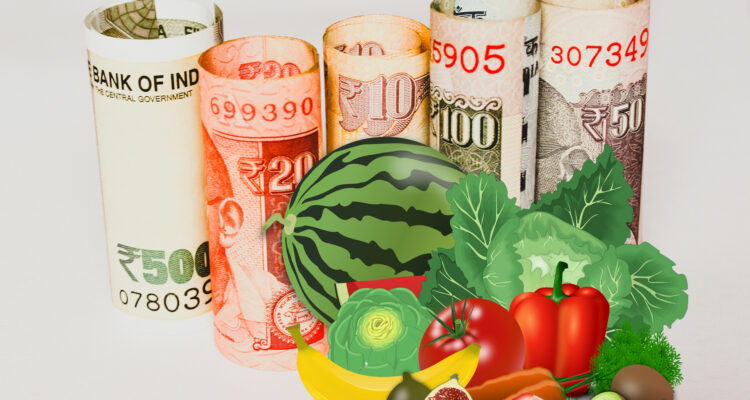◊ By Shivranjani Gupta
Visit ORGANIC SHOP by Pure & Eco India
Organic food is food that is grown without synthetic fertilisers, pesticides, or growth enhancers. Conventional food, on the other hand, is food that does not restrict the use of these chemicals.
While it makes more sense for organic food to cost less because it is devoid of added chemicals and has fewer ingredients – this is not the case. Organic food may cost around 20 to 100% more than conventionally produced food.
WHY ORGANIC FOOD IS MORE EXPENSIVE THAN REGULAR (CONVENTIONAL) FOOD
Growing Organic Food is Labour Intensive
The usage of fertilisers and pesticides makes it easier for farmers to grow conventional food with minimum time and labour. Since cheap fertilisers and pesticides cannot be used in organic food, farming the latter requires high-quality, round-the-clock manual care. Controlling pests and tending to crops is a labour intensive and time-consuming task. Planning crop cycles, tending to the harvest, processing, and storing the crops requires more hours and people than in conventional farming.
Farming Organic Food Involves Crop Rotation
Conventional farming utilises every acre of land – and owing to the added chemicals, year-round crop production is possible. Organic farming, on the other hand, requires careful consideration of soil quality, crop suitability, and rotation to ensure the nitrogen and nutrient content of the soil is preserved and replenished. Rotation cycles also reduce the quantity of the produce, with limitations on when it is grown and how much of the final produce is available for sale.
There is a Gap in Demand and Supply
Only 0.9% of farmlands worldwide are organic farmlands. With crop rotations, specific quality maintenance requirements, and smaller farmlands, organic crops do not match up to the growing market demands for healthier food. Not to mention, compared to conventional farming, the yields in organic farming are relatively lower as this form of farming bans any use of chemicals to repel pests, relying instead on natural pest repellents such as neem juice, etc, to ward off pests and crop disease.
Conventional food is easily grown in larger quantities, and hence it is easy to drive down the prices for them. Whereas, for organic food, since the demand is high and the supply, low, prices invariably rise.
Organic Foods require Special Quality Licenses and Certification
Organically produced food requires special clearances for land, equipment, and processing. The soil quality is essential for organic food production; thus, many organic farmlands are in remote locations, driving up shipping costs. Furthermore, equipment for livestock care, harvesting, storage, and shipping involve more care and increased costs. Organic certification entails spot inspections, regular upkeep and maintenance – which are also very costly. Even application and paperwork for the licenses is expensive and increases the cost of production.
Organic Cultivation demands Money & Time to be spent on gaining Farming Knowledge
Organic farming involves a constant need to upskill and upgrade the farmers’ knowledge and skillset. Organic farming education has grown exponentially with many environmental factors and considerations requiring attention to make the produce eco-friendly and sustainable. From the kind of seeds to buy, to the kind of packaging to use, organic farming demands a nuanced understanding of the intricate threads that come together to bring wholesome foods to our table.
While these factors drive up the prices of organic foods, buying sustainably and organically produced foods reduces harmful environmental and health impact. At Conscious Food, great care is taken to ensure that the food on your table nourishes you, as well as, the environment.
The author is Chief Marketing Officer, Conscious Food



Manufacturing organic food
Good to see this spelled out for all to read.
What I know is organic farming requires time and also the volume of organic products are lesser than the regular product we farm using pesticides & fertilizer.
Precisely…organic farming does not employ chemical pesticides.
Input cost can be reduced and yield can be increased with the use of bio fertilizer like PlanTonic available at http://www.orangecitynaturals.com
Hi, I would like to gain knowledge about Organic farming.